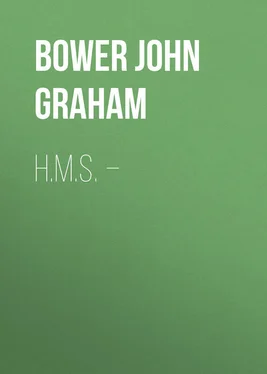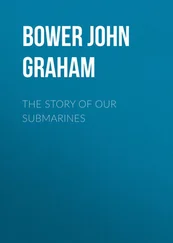John Bower - H.M.S. –
Здесь есть возможность читать онлайн «John Bower - H.M.S. –» — ознакомительный отрывок электронной книги совершенно бесплатно, а после прочтения отрывка купить полную версию. В некоторых случаях можно слушать аудио, скачать через торрент в формате fb2 и присутствует краткое содержание. Жанр: foreign_antique, foreign_prose, foreign_language, на английском языке. Описание произведения, (предисловие) а так же отзывы посетителей доступны на портале библиотеки ЛибКат.
- Название:H.M.S. –
- Автор:
- Жанр:
- Год:неизвестен
- ISBN:нет данных
- Рейтинг книги:3 / 5. Голосов: 1
-
Избранное:Добавить в избранное
- Отзывы:
-
Ваша оценка:
- 60
- 1
- 2
- 3
- 4
- 5
H.M.S. –: краткое содержание, описание и аннотация
Предлагаем к чтению аннотацию, описание, краткое содержание или предисловие (зависит от того, что написал сам автор книги «H.M.S. –»). Если вы не нашли необходимую информацию о книге — напишите в комментариях, мы постараемся отыскать её.
H.M.S. – — читать онлайн ознакомительный отрывок
Ниже представлен текст книги, разбитый по страницам. Система сохранения места последней прочитанной страницы, позволяет с удобством читать онлайн бесплатно книгу «H.M.S. –», без необходимости каждый раз заново искать на чём Вы остановились. Поставьте закладку, и сможете в любой момент перейти на страницу, на которой закончили чтение.
Интервал:
Закладка:
"She's coming, sir," said the foreman, turning to the King's Harbourmaster; "she'll just do it nicely. That was the new tug's whistle."
A couple of capstan bollards began to clatter round as steam was turned on and a heavy wooden fender swung with a crash over the rounded edge of each entrance wall. The mist was clearing now, and the traffic in the harbour could be dimly seen. A foreman pointed to seaward, and the younger officer followed his arm with his tired eyes. Over the fog a slender dark line showed with a blurred foretop below. The unmistakable tripod mast of a big ship showed gradually through, and as he watched he was reminded of a magic-lantern picture out of focus being gradually brought into definition by the operator. The mist cleared faster than she approached, and at a quarter of a mile he could see the great looming bow surmounted by tier on tier of bridges, which mounted almost to the high overhanging top. She crawled slowly on, using her own engines, the hawsers leading to the furiously agitated paddle tugs on bow and quarter sweeping slack along the stream. On the tall "monkey's island" a group of figures clustered together, and the gleam of gold-peaked caps showed among the blue overcoats. At half a cable's length the voices of the leadsmen, inarticulate and faint before, could be clearly heard. "And a ha-a-a-f nine" – "and a ha-a-a-f nine." The bow tugs sheered off to each side, and whistles blew shrilly. The heavy bow hawsers fell splashing in the water, and the jingle of engine-room telegraph bells echoed up the walls of the entrance. A couple of dingy black "rigger" boats, propelled "Maltee fashion," with the rowers standing facing forward, appeared between the dockyard wall and the great curved stem. Heaving-lines sailed through the air, uncoiling as they flew, and the boats rowed furiously back to the entrance. From somewhere aft by the turret a great bull voice spoke through a megaphone. The riggers at the entrance leapt into sudden activity, and for five minutes the din and clatter of capstans, shrilling of whistles, and splash of hawsers in the water broke the spell of silence. The noise died suddenly, and the note of telegraph bells came ringing again from the high grey monster. Slowly she gathered way, and to the clatter of the dockyard capstans as the slack of the hawsers was taken in, her forty-foot curved stem passed the black caisson gates. The two officers, the young and the old, stepped to the edge of the wall and looked across. Her stem had hit off the exact centre of the entrance, but there was a good two hundred yards of her to come yet. In dead silence, with groups of men fallen in at attention along her side, she flowed on, her speed a bare two knots, but a speed in keeping with her enormous bulk and majesty. As she entered, and the finer lines of her bow passed, she seemed to swell, till she almost filled the entrance, and it looked as if one could step aboard her from the lock-side. The eyes travelled from the mighty turret guns that glistened in the rain, and were attracted up and up till heads were tilted back to look at the highest bridge of all. A quiet incisive voice could be clearly heard: "Port ten" – "'Midships" – "Stop both." Again the "kling-kling" of bells and then silence. The grey-haired officer on the wall raised his hand in salute, and a tall grave captain, looking down from above, saluted in return, showing a flash of white teeth in a smile of recognition.
As she passed the hawsers came with her, transferred from bollard to bollard by gangs of staggering men. The passage of her stern past the outer entrance seemed to break a spell, as if the hypnotism of hundreds of staring eyes had passed away. The caisson gates ground to with almost indecent haste behind her, as some castle portcullis might do as the last prisoner was dragged through. Whistles blew, answering each other across the oily, rain-pitted water of the basin, and to the weeep we-ooo of pipes and the roar of the boatswains mates' voices, the lines of rigid men on the great ship's side broke up and fell back. She had left the open sea and had become "Number 955 – for refit – in Dockyard hands."
"How long is she for, sir? Ten days?"
The grey-haired officer turned: "No, only eight. They want her back as soon as possible. Four days' leave to each watch and she'll be off again. You're looking cold, boy – come up to breakfast. That malaria hasn't left you yet."
"I wish it would, sir. I want to get to sea again.
"I know. It's not so bad to watch them come in, but it makes me feel old when I see them leaving again. But you needn't worry, the War's going on a long time yet."
"OUR ANNUAL."
Up the well-remembered fairway, past the buoys and forts we drifted —
Saw the houses, roads, and churches, as they were a year ago.
Far astern were wars and battles, all the dreary clouds were lifted,
As we turned the Elbow Ledges – felt the engines ease to "Slow."
Rusty side and dingy paintwork, stripped for war and cleared for battle —
Saw the harbour-tugs around us – smelt the English fields again, —
English fields and English hedges – sheep and horses, English cattle,
Like a screen unrolled before us, through the mist of English rain.
Slowly through the basin entrance – twenty thousand tons a-crawling
With a thousand men aboard her, all a-weary of the War —
Warped her round and laid alongside with the cobble-stones a-calling —
"There's a special train awaiting, just for you to come ashore."
Out again as fell the evening, down the harbour in the gloaming
With the sailors on the fo'c'sle looking wistfully a-lee —
Just another year of waiting – just another year of roaming
For the Majesty of England – for the Freedom of the Sea.
MASCOTS
When the galleys of Phœnicia, through the gates of Hercules,
Steered South and West along the coast to seek the Tropic Seas,
When they rounded Cape Agulhas, putting out from Table Bay,
They started trading North again, as steamers do to-day.
They dealt in gold and ivory and ostrich feathers too,
With a little private trading by the officers and crew,
Till rounding Guardafui, steering up for Aden town,
The tall Phœnician Captain called the First Lieutenant down.
"By all the Tyrian purple robes that you will never wear,
By the Temples of Zimbabwe, by King Solomon I swear,
The ship is like a stable, like a Carthaginian sty.
I am Captain here – confound you! – or I'll know the reason why.
Every sailor in the galley has a monkey or a goat;
There are parrots in the eyes of her and serpents in the boat.
By the roaring fire of Baal, I'll not have it any more:
Heave them over by the sunset, or I'll hang you at the fore!"
"What is that, sir? Not as cargo? Not a bit of private trade?
Well, of all the dumbest idiots you're the dumbest ever made,
Standing there and looking silly: leave the animals alone ."
(Sailors with a tropic liver always have a brutal tone.)
"By the crescent of Astarte, I am not religious – yet —
I would sooner spill the table salt than kill a sailor's pet."
THE SPARROW
A perfectly calm blue sea, a blazing June sun, and absolutely nothing to break the monotony of a blank horizon. The sparrow was deadbeat, and was travelling slowly to the north and west on a zigzag course, about two hundred feet high. The sparrow had no right to be there at all. He hailed from a Yorkshire hedgerow, and nothing but a real three-day fog and westerly winds could have brought him over such a waste of waters. He had been flying in a circle all night, swerving at intervals down to the water in the vain hope of finding rest for his aching muscles. Now he was heading roughly towards his home with but slight hopes of ever reaching it.
Читать дальшеИнтервал:
Закладка:
Похожие книги на «H.M.S. –»
Представляем Вашему вниманию похожие книги на «H.M.S. –» списком для выбора. Мы отобрали схожую по названию и смыслу литературу в надежде предоставить читателям больше вариантов отыскать новые, интересные, ещё непрочитанные произведения.
Обсуждение, отзывы о книге «H.M.S. –» и просто собственные мнения читателей. Оставьте ваши комментарии, напишите, что Вы думаете о произведении, его смысле или главных героях. Укажите что конкретно понравилось, а что нет, и почему Вы так считаете.











